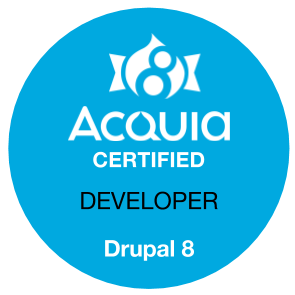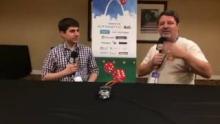The Internet of Things (IoT) is fundamentally changing how we interact with the digital world. In this talk, we’ll explore the implementation of live examples which bridge the gap between the physical and digital world using PHP: asking Alexa for information on php[world] conference sessions; displaying API data on an Arduino-powered display; using PHP to control LEDs on a Raspberry Pi to monitor application uptime; and connecting IR sensors to Slack to see whether a conference room is in use.
PHP
Markdown is one of the most popular markup languages on the Web. Unfortunately, with no standard specification, every implementation works differently, producing varying results across different platforms. The CommonMark specification fixes this by providing an unambiguous syntax specification and a comprehensive suite of tests. Attendees will learn about this standard and how to integrate the league/commonmark parser into their applications. We will also cover how to add new syntax and other features to the parser to fit your custom needs.
Software bugs are inevitable; some are especially difficult to track down, causing you to waste countless hours before throwing your hands up in defeat. It doesn't have to be this way! The mental fatigue and wasted time can be avoided by using strategies like identifying the most-appropriate tool, taking a logical & objective approach, challenging assumptions, listening to variables, isolating the code path, and reinforcing code with automated tests.
The goal of this talk is to educate developers on common security vulnerabilities, how they are exploited, and how to protect against them. We'll explore several of the OWASP Top 10 attack vectors like SQL injection, XSS, CSRF, session hijacking, and insecure direct object references. Each topic will be approached from the perspective of an attacker to see how these vulnerabilities are detected and exploited using several realistic examples.
Software bugs are inevitable; some are especially difficult to track down, causing you to waste countless hours before throwing your hands up in defeat. It doesn't have to be this way! The mental fatigue and wasted time can be avoided by using strategies like identifying the most-appropriate tool, taking a logical & objective approach, challenging assumptions, listening to variables, isolating the code path, and reinforcing code with automated tests.
This talk educates developers on common security vulnerabilities, how they are exploited, and how to protect against them. We'll explore several of the OWASP Top 10 attack vectors like SQL injection, XSS, CSRF, and others. Each topic will be approached from the perspective of an attacker to see how these vulnerabilities are detected and exploited using several realistic examples. We'll then apply this knowledge to see how web applications can be secured against such vulnerabilities.
Software bugs are inevitable; some are especially difficult to track down, causing you to waste countless hours before throwing your hands up in defeat. It doesn't have to be this way! The mental fatigue and wasted time can be avoided by using strategies like identifying the most appropriate tool, taking a logical and objective approach, challenging assumptions, listening to variables, isolating the code path, and reinforcing code with automated tests.
- Learn more about CommonMark at Colin’s Nomad PHP Talk CommonMark: Markdown Done Right
- Frederick Web Tech Meet-up
- Recorded at PHP Tek 2016
Software bugs are inevitable; some are especially difficult to track down, causing you to waste countless hours before throwing your hands up in defeat. It doesn't have to be this way! The mental fatigue and wasted time can be avoided by using strategies like identifying the most-appropriate tool, taking a logical & objective approach, challenging assumptions, listening to variables, isolating the code path, and reinforcing code with automated tests.
The goal of this talk is to educate developers on common security vulnerabilities, how they are exploited, and how to protect against them. We'll explore several of the OWASP Top 10 attack vectors like SQL injection, XSS, CSRF, session hijacking, and insecure direct object references. Each topic will be approached from the perspective of an attacker to see how these vulnerabilities are detected and exploited using several realistic examples.





